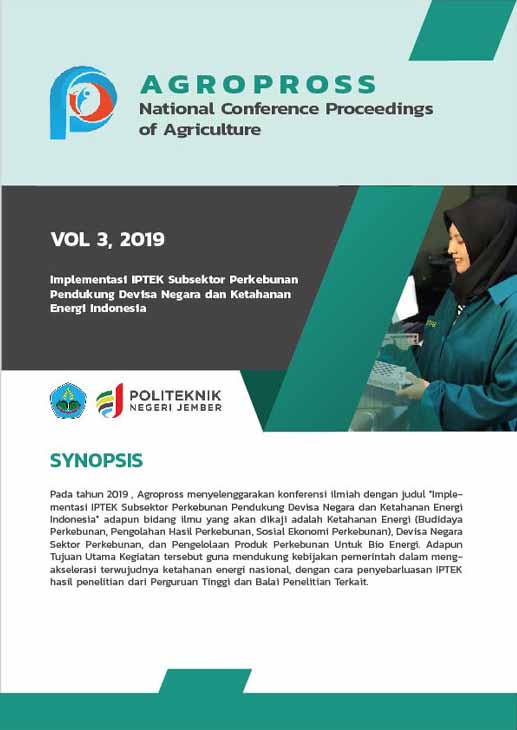Komparasi Efektivitas Metode Pengendalian Hama Rayap (Macrotermes gilvus) Secara Manual, Kimia, Dan Biologi Di Perkebunan Kelapa Sawit Studi Kasus Di PT Ketapang Subur Lestari
Kata Kunci:
Fipronil 50 SC, Macotermes gilvu, Metarhizum anisopliae, Termites control, oil palm plantationAbstrak
Macrotermes gilvus is soils termites that decompost the organic materials. On the other hand, termites has negative impact to palm oil because it also destroy roots and fallen down the plant. The purposes of this research is to compare classical, chemical, and biologcal method to control the termites. Effective appropriate indicators was observed, which are the nest conditions, the existence of termites collonies at palm oil plants arround the nest, time to control the termites, and the application cost. The research was held in PT Ketapang Subur Lestaries oil palm plantations from March to May 2019. The classicals method applied by crushing the nest with the hoe. The Chemicals method was done by crushing the nest and applied the termiticide with Fipronil 50 SC. The biologicals method was carried out by holing the nest then infected the collonies with the Metarhizium anisopliae. The results figure that by classicals method, after controling manually, the nest of the termites still growing, the controling cost was Rp 19.413,-/nest, and the controling time was 14 minutes/nest. By chemicals, the nests was not growing any more, the controling cost was Rp 36.331,-/nest, and the controling time was 28 minutes/nest. By biologicals method, the nests was still growing, the controling cost was Rp 28.505,-/nest, and the controling time was 25 minutes/nest.
Unduhan
Referensi
rim termite research group (PRTRG). Asosiasi Perusahaan Pengendalian Hama Indonesia (ASPPHAMI).
Pawana, C. 2016. Pengukuran populasi rayap tanah Macrotermes gilvus dan teknik pengendaliannya menggunakan termitisida berbahan aktif Fipronil pada perkebunan kelapa sawit milik rakyat di kabupaten Mesuji Lampung. Skripsi. IAIN Raden Intan, Lampung.
Pribadi, T. 2009. Keanekaragaman komunitas rayap pada tipe penggunanaan lahan yang berbeda sebagai bioindikator kualitas lingkungan. Tesis. Sekolah Pascasarjana Institut Pertanian Bogor, Bogor.
Sornnuwat, Y., Vongkaluang, C., Takematsu, Y. 2004. A Systematic Key To Termites of Thailand. Kasetsart J. (Nat. Sci.) 38 : 349 – 368.
Subekti, N., Duryadi, D., Nandika, D., Surjokusumo, S., Anwar, S. 2008. Sebaran dan karakter morfologi rayap tanah Macrotermes gilvus Hagen di habitat hutan alam. Jurnal Ilmu dan Teknologi Hasil Hutan 1(1):27-33.
Tobing, D. R. L. 2007. Penggunaan berbagai konsentrasi khitosan dan Fipronil terhadap pengendalian hama rayap tanah Macrotermes gilvus Hagen (isopteran; termitidae) di laboratorium. Skripsi. Fakultas Pertanian Departemen Ilmu Hama dan Penyakit Tumbuhan Universitas Sumatra Utara, Medan.
Widiyanti, N. L. P. M., Muyadihardja, S. 2004. Uji toksisitas Metarhizium anisopliae terhadap larva nyamuk Aedes aegypti. Media Litbang Kesehatan 14(3).
Unduhan
Diterbitkan
Cara Mengutip
Terbitan
Bagian
Lisensi
Hak Cipta (c) 2019 Muhammad Ali Rafli, Sylvia Madusari, Jojon Soesatrijo

Artikel ini berlisensi Creative Commons Attribution 4.0 International License.
Hak cipta (Copyright) artikel yang dipublikasikan di Agropross : National Conference Proceedings of Agriculture dipegang oleh penulis (Copyright by Authors) di bawah Creative Commons Attribution 4.0 International License (CC-BY). Sehingga penulis tidak memerlukan perjanjian pengalihan hak cipta yang harus diserahkan kepada redaksi.






